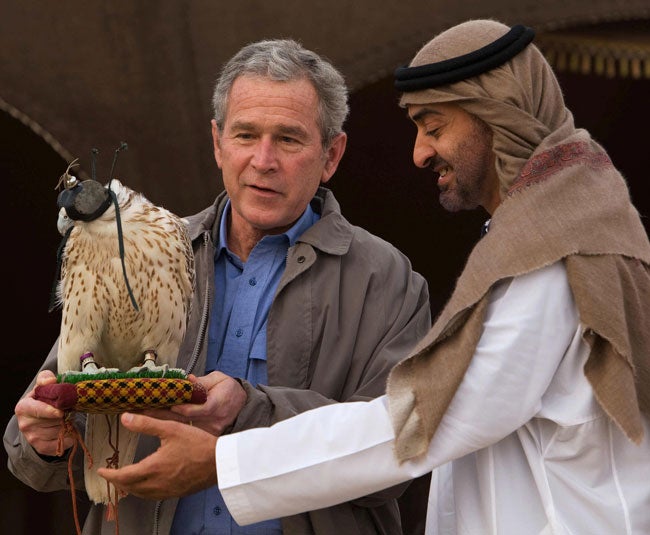Bush: pace of withdrawal from Iraq may have to slow

Your support helps us to tell the story
From reproductive rights to climate change to Big Tech, The Independent is on the ground when the story is developing. Whether it's investigating the financials of Elon Musk's pro-Trump PAC or producing our latest documentary, 'The A Word', which shines a light on the American women fighting for reproductive rights, we know how important it is to parse out the facts from the messaging.
At such a critical moment in US history, we need reporters on the ground. Your donation allows us to keep sending journalists to speak to both sides of the story.
The Independent is trusted by Americans across the entire political spectrum. And unlike many other quality news outlets, we choose not to lock Americans out of our reporting and analysis with paywalls. We believe quality journalism should be available to everyone, paid for by those who can afford it.
Your support makes all the difference.In a development that could have an impact on the US presidential race, President George Bush said yesterday that the US could slow the pace of troop withdrawals from Iraq if commanders on the ground considered it necessary.
Mr Bush, speaking in Kuwait after meeting General David Petraeus, the senior US commander in Iraq, and Ryan Crocker, the American ambassador in Baghdad, said further reductions this year, beyond the 30,000 already announced, would depend on what the general recommended. He and Mr Crocker are due to report to Congress in March.
"My attitude is, if he [Gen Petraeus] didn't want to continue the drawdown, that's fine with me, in order to make sure we succeed," Mr Bush said after the meeting. "I said to the general, 'If you want to slow her down, fine. It's up to you.'" But in an election year, such a proposal could have a tough time in Congress. Iraq is the main reason for Mr Bush's record unpopularity in the polls, and Democrats have been pushing hard, so far unsuccessfully, for faster and deeper troop cuts.
In the past week, 5,000 US and Iraqi troops have launched an offensive to clear al-Qa'ida militants from Diyala province, north of Baghdad, which the research group Iraq Body Count says is now the most violent in Iraq. But military experts have warned that pacifying Diyala, with a mixed population of Sunnis, Shias and Kurds, will be far more difficult than in Anbar – the success story of the "surge" – which is almost exclusively Sunni. Yesterday, however, the Iraqi parliament finally adopted a measure long urged by the US, aimed at reversing one of the main causes of Sunni resentment: the sacking of Baath party members from all government jobs. The way has now been cleared to reinstate them.
Mr Bush is touring Arab states to seek support for his new Middle East peace effort. One of his main tasks is to try and persuade hitherto reluctant Arab states to put political as well as financial support behind Palestinian President Mahmoud Abbas during the negotiating process with Israel over the next year. Gulf states, led by Saudi Arabia, have been slow to give full backing to a process that entirely excludes Hamas, which seized full internal control of Gaza over six months ago.
The US Secretary of State, Condoleeza Rice, implicitly acknowledged the scepticism, saying she did not expect the Arab states to have a "blinding flash" in favour of it on this trip, but hoped their endorsement would come "over time".
Gulf states have shown equal lack of enthusiasm for another of Mr Bush's preoccupations: banging the drum against Iran, which he mentioned four times in his 15-minute statement after the Petraeus-Crocker meeting. Local reports said Kuwait's emir would tell Mr Bush of his concerns that a US strike on Iran would destabilise the Gulf, which is the key to world oil supplies.
A senior Omani official stressed that the members of the Gulf Co-Operation Council were seeking a negotiated solution to the crisis with Iran over its nuclear ambitions, and did not see why a country should be prevented from obtaining nuclear-generated electricity under UN supervision.
"We have excellent relations with Iran. We don't see a threat from Iran's nuclear programme and we are their next-door neighbour," the official told The Independent on Sunday. He also played down Iran's threat to close down the Strait of Hormuz in the case of a possible armed confrontation with the US, pointing out that the Iranians "would also suffer from the closure of Hormuz".
But the Gulf states believe that "we must stand firm against military intervention," the official said.
Join our commenting forum
Join thought-provoking conversations, follow other Independent readers and see their replies
Comments